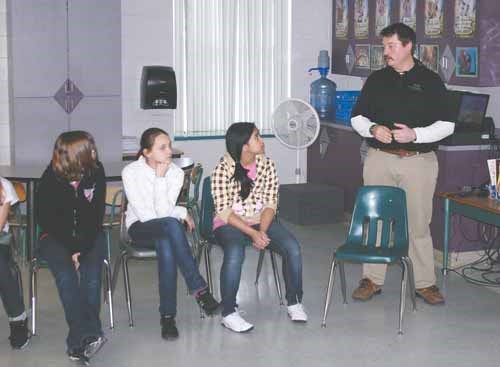It is important youth know that when something feels wrong they can tell others who will help them deal with the situation.
Today we are talking about standing up for themselves," said Rhonda Johannson, and advocate with Saskatchewan Advocate, a Voice for Children and Youth. She was speaking at the Violence Awareness and Prevention Conference held at Dr. Brass School in the city Friday.
Johannson said through her presentation to the Grade 7 students from throughout the Good Spirit School Division she was trying to give youth "the skills to stand up for themselves," skills which Johannson termed "self-advocacy skills," is important as it is self-empowering. Having such skills helps youth not only stand up for themselves, but also to be able to speak "for other youth who need a voice."
Jason Gordon, principle at Dr. Brass and Conference presenter said, seeking support from peers against bullying can be a powerful avenue to deal with the situation. He said peers often after more influence on others within the same age group than might be realized.
Johannson said children may face many forms of violence and bullying, and they need to know "they can go to someone, they can tell somebody. They speak out to other people in their lives to get the help that they need."
Johannson said that was the key element of her presentation to help youth "to find the courage and confidence to speak up."
Jody Harman, one of the Conference organizers said youth can face "a lot of issues" which come down to violence and bullying, adding for the past four years the one-day event has tried to help provide Grade 7 students with ways to best deal with such situations.
The day included presentations from the Red Cross, Shelwin House, Orcadia Youth Centre, Addiction Services and others.
Harman said the line-up was developed by looking back at questionnaires filled out by past participants to see what resonated best with them, "what was useful and what was not so useful."
Bob Buhler, another of the event organizers said it is a case of trying to provide students with tools they can use.
"You hope when you give them information to deal with situations they will learn from it," he said, adding they can only hope students accept what is offered and use it if they ever need it."
Lynae Schendel said the Conference did not offer all the answers, but added it is "a step" in the process for students.
Harman noted students attended the sessions held throughout the day in class groups with the hope "teachers take it back to the classroom to follow up," on what is presented.
Gordon said he tried to give students an understanding of what bullying is.
"I'm trying to give kids a good definition of what bullying is and what it is not," he said, adding bullying occurs when there is "an imbalance of power," and someone feels uneasy, or threatened by the power imbalance.
It may seem like an obvious response to seek help but Johannson said among the callers turning to the advocacy group "there's definitely feelings they're isolated. They are not sure how to address the issues on their own."
Gordon said it is a case of raising awareness about what is bullying and then how to best deal with it."
Youth are becoming more aware there is help like the Saskatchewan Advocate, said Johannson.
"Our numbers (of calls) have increased quite a bit," she said. "We get a lot of calls about bullying. They're not sure how to handle what they're experiencing."
That said, Johannson said it is "really difficult" to say youth are facing more bullying.
"The level of awareness and impact it has on children is so much more understood than it has been in the past," she said.
Gordon agreed it is difficult to gauge if bullying is more prevalent today.
"I think we're just more aware of it because more people are willing to address it," he said.
Gordon did add cyber-bullying is a new area of concern, adding it can be worse because kids are always connected through social media sites, texting and email.
"It's an additional aspect of being picked on," he said.
Schendel agreed the cyber aspect of bullying "has changed things," adding it is a form of bullying which can be 24/7, and more difficult to confront.
Johannson said it helps "there are so many more means to reach out for help." That includes calling the Advocate at 1-800-322-7221 or check out www.saskadvocate.ca




